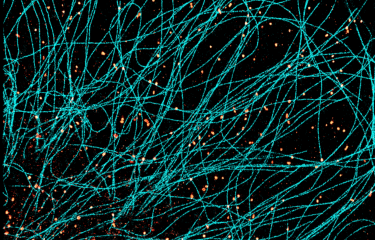Artificial intelligence methods such as deep learning are enabling breakthrough advances in biomedical data analysis. From medical diagnosis and DNA sequence analysis to augmented microscopy and molecular design, the scope of applications for artificial intelligence is constantly expanding and drawing on ever larger datasets. However, most research studies based on deep learning do not enable users to fully adapt such methods to their own data, and making reuse of published methods can be difficult for non-IT specialists. To overcome these obstacles, scientists in the Institut Pasteur's Imaging and Modeling Unit have designed a platform that offers easier access to deep learning for the biomedical community.
Computer methods known as "deep learning" are central to the current renaissance of artificial intelligence and big data analysis (see our report on "How big data is revolutionizing health research").
These methods use networks of artificial neurons to process complex digital data such as medical images and DNA sequences. After a learning phase, these algorithms are capable, for example, of diagnosing potentially cancerous skin lesions as accurately as a qualified dermatologist, of predicting how a mutation will affect gene expression, or of speeding up high-resolution cell imaging. But despite their huge potential, such methods are often difficult to implement for physicians or biologists without training in computer science, especially when it comes to retraining deep learning models with new data, which is generally required to obtain high quality results.
ImJoy – powerful but easy to use artificial intelligence tools
Scientists at the Institut Pasteur, in collaboration with the Royal Institute of Technology in Stockholm and Stanford University, have developed ImJoy, a computational platform which aims to make deep learning accessible to the biomedical community and beyond. The platform was designed to offer powerful data analysis tools that are easy to use. "ImJoy enables users without programming skills, both to reuse pretrained neural networks and to train them on new data," explains Christophe Zimmer, head of the Imaging and Modeling Unit at the Institut Pasteur. ImJoy works with various computing environments, including desktop computers, remote servers (cloud computing) and smartphones. Since it requires no Internet access, it can be used to analyze sensitive data. ImJoy can also run programs written in different computer languages (JavaScript, Python, etc.), which can exchange data via dedicated gateways.
To illustrate the potential of ImJoy, the scientists have already implemented a number of tools using deep learning, in order to, for example:
- improve the quality of microscopy images;
- segment cell images;
- analyze the cellular location of proteins;
- diagnose skin lesions;
- predict protein affinity with various DNA sequences.
"ImJoy should facilitate the adoption of deep learning in the biomedical community and accelerate the use of big data for scientific discovery and medicine," concludes Christophe Zimmer.
The ImJoy platform, together with its source code, are openly available by clicking here.
The Institut Pasteur at the heart of the digital revolution
The Institut Pasteur is playing an active part in the digital revolution by developing new computational tools for health applications. To address the challenges of basic science and public health, the Institut Pasteur's scientists work tirelessly to advance their research in biology, bioinformatics, physics and social science. For example, scientists in the Evolutionary Bioinformatics Unit have recently developed a tool based on decision-theory concepts, which reconstructs "ancestral scenarios" that describe the evolution of traits or characters along phylogenetic trees. Other scientists in the Pasteur Microbes and Health Carnot Institute, composed of several Institut Pasteur departments and technological platforms, have developed a tool based on artificial intelligence that can be used to monitor the behavior of groups of mice in real time and characterize their social interactions.
Source
ImJoy: an open-source computational platform for the deep-learning era, Nature Methods, November 28th, 2019
Wei Ouyang1,2, Florian Mueller1, Martin Hjelmare2, Emma Lundberg2,3,4 and Christophe Zimmer1
1 Imaging and Modeling Unit, Institut Pasteur, UMR 3691 CNRS, C3BI USR 3756 IP CNRS, Paris, France.
2 Science for Life Laboratory, School of Engineering Sciences in Chemistry, Biotechnology and Health, KTH - Royal Institute of Technology, Stockholm, Sweden.
3 Department of Genetics, Stanford University, Stanford, CA, USA.
4 Chan Zuckerberg Biohub, San Francisco, CA, USA.





